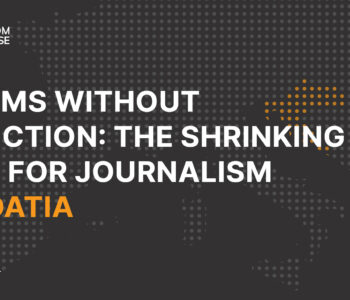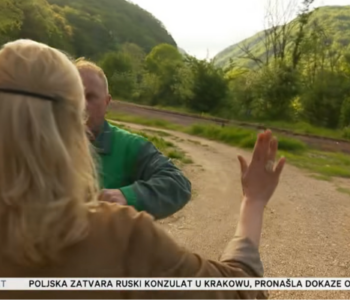
Open Letter to Michael O’Flaherty, Commissioner for Human Rights of Council of Europe
The undersigned organisations write to you as Partners of the Council of Europe’s Platform for the Safety of Journalists, which we have contributed to since its inception 10 years ago. As partners of the Platform, we are strongly committed to advocating for media freedom and independent journalism across Europe and reinforcing the response of the Council of Europe to threats to journalists, media workers and outlets in its member states.
13.06.2025
In this light, we would first like to thank you for your recent letter sent to Hungarian authorities regarding the draft Law on the Transparency of Public Life, which was submitted to Parliament on 13 May 2025.
On 4 June, it was reported that the vote on the Bill had been postponed until after the summer due to internal disagreements within the ruling Fidesz party. This is a very welcome development which allows for greater mobilisation against the Bill in the coming months. Our organisations fear this Bill will return, potentially with amendments included. As we have seen in the past in Hungary under Fidesz, legislative proposals can be brought forward and passed with the government’s two-thirds majority in a quick time frame, with limited scrutiny or input from civil society, including the media. The threat the Bill poses has not passed, but is merely on hold.
In this regard, we welcome the concerns outlined in your letter to the Speaker of the Hungarian National Assembly, which identified many of the serious threats posed by the draft law to Hungarian human rights and democracy, and the clear risk of the legislation’s disproportionate and discriminatory abuse against entities in Hungarian society seen as critical of the government.
However, our organisations are concerned that the fundamental and existential threat posed by the draft foreign funding law to what remains of the country’s independent journalist and media community was not sufficiently reflected in the letter, which overlooked a central element of the overall motive of the law: the silencing of what remains of the free press in Hungary.
As our organisations have outlined in multiple statements as well as our alert to the COE Platform, the draft Bill – which permits the blacklisting, financial restriction and potential closure of media outlets – represents the most serious attack on Hungarian media in years and is the latest step in a more than decade-long campaign by the government to stigmatise independent journalism, undermine its business model and systematically erode media pluralism.
While the Bill itself is careful not to mention media directly, its scope involves any legal entity registered in Hungary which carries out activities capable of influencing public opinion or democratic debate, meaning it directly encompasses media, and poses an equal threat to civil society, NGOs and independent media which receive any form of foreign funding.
As our organisations have documented, since its establishment the Sovereignty Protection Office has been aggressively labelling major independent media outlets such as Telex, 444.hu, Átlatszó and Partizán as entities carrying out the bidding of vested foreign interests. Meanwhile leading politicians have repeatedly smeared independent media as enemies and foreign agents in recent months, in clear preparation for their backlisting. Given the already discriminatory approach of the SPO, we believe any independent media critical of the government will be among the first targets of the backlisting when the law is passed, for which they will have no legal recourse to appeal.
Since the introduction of the Bill, our organisations have spoken to multiple editors and journalists in Hungary who fear the passing of the law and the strengthening of the SPO will force them to re-register their media outlets outside the country to avoid excessive punitive sanctions, fines or closure. This would result in the unthinkable: the first exiled media community from an EU member state. Our conversations with sources in Hungary indicate this is an increasingly likely scenario, if the Bill is passed.
It must also be underlined that this Bill is one element of a systematic attack on media freedom in Hungary, where over the past decade the government has overseen the erosion of media pluralism to the point where the government now controls, directly or indirectly, 80% of the media landscape. Fidesz has established and now maintains the most captured media environment ever established in the European Union.
As Commissioner for Human Rights, our organisations therefore thank you again for your letter, but urge you to ensure the severe danger this Bill poses to independent media – as well as to civil society organisations, private individuals and politicians – is adequately communicated in further public outputs or meetings on this topic in the future, if and when the Bill reemerges.
Our organisations are available for briefings or to organise meetings with leading Hungarian journalists, who can underscore first-hand the severe danger that the Bill poses to their future existence within Hungary, if ultimately passed.
More broadly, we would appreciate the opportunity to continue our exchange with you following our meeting in Strasbourg on 3 March 2025, regarding the challenges to the media in the Council of Europe region, and will follow up with your office shortly about your availability to meet us after the summer recess.
We remain committed to strengthening the Council of Europe’s Platform for the Safety of Journalists and look forward to your response.
This statement was coordinated by the Media Freedom Rapid Response (MFRR), a Europe-wide mechanism which tracks, monitors and responds to violations of press and media freedom in EU Member States and Candidate Countries.











